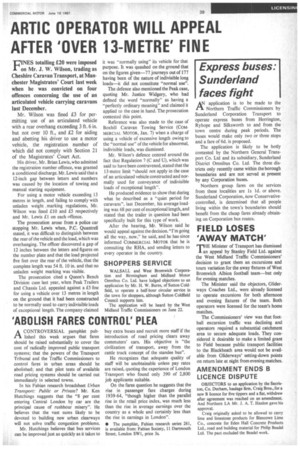'ABOLISH FARES CONTROL' PLEA
Page 41

If you've noticed an error in this article please click here to report it so we can fix it.
ACONTROVERSIAL pamphlet published this week argues that fares should be raised substantially to cover the cost of radically improved public transport systems; that the powers of the Transport Tribunal and the Traffic Commissioners to control fares in urban areas should be abolished; and that pilot tests of available road pricing systems should be carried out immediately in selected towns.
In his Fabian research broadsheet Urban Transport: Public or Private? Mr. Ken Hutchings suggests that the "8 per cent entering Central London by car are the principal cause of rushhour misery". He believes that the vast sums likely to be devoted to building new urban clearways will not solve traffic congestion problems.
Mr. Hutchings believes that bus services can be improved just as quickly as it takes to buy extra buses and recruit more staff if the introduction of road pricing clears away commuters' cars. His objective is "the civilization of transport, away from the cattle truck concept of the standee bus".
He recognizes that adequate quality of staff will be unobtainable unless pay rates are raised, quoting the experience of London Transport who found only 390 of 2,800 job applicants suitable.
On the fares question he suggests that the rise in passenger fare charges during 1939-64, "though higher than the parallel rise in the retail price index, was much less than the rise in average earnings over the country as a whole and certainly less than the rise in earnings in London".
• The pamphlet, Fabian research series 261, is available from: Fabian Society, 11 Dartmouth Street, London SW1, price 3s.




































































































































